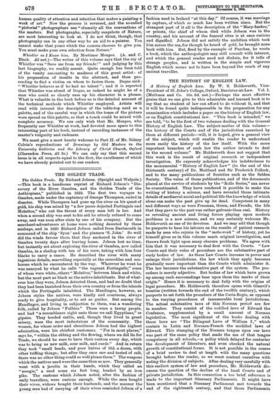The Golden Trade. By Richard Jobson. (Speight and Walpole.) —This
book is a handsome reprint of Richard Jobson's "Dis- covery of the River Gambra, and the Golden Trade of the Aethiopians," published in 1623. The first two voyages to Gambra, made under the captaincy of George Thompson, ended in disaster. While Thompson had gone up the river on his quest of gold, his ship was seized by "a few poore dejected Portingals and Melattos," who cut the throat of every man left in her. And when a second ship was sent to his aid he utterly refused to come away, and was soon after slain by one of his company. But the merchant-adventurers at home were nothing daunted by these mishaps, and in 1620 Richard Jobson sailed from Dartmouth in command of the ship 'Syon' and the pinnace 'S. John.' So well did the winds favour them that they anchored in the river of Gambra twenty days after leaving home. Jobson lost no time, but instantly set about exploring the river of Gambra, now called Gambia, in a shallop with ten of his crew, taking with him four blacks to carry a canoe. He described the river with many ingenious details, marvelling especially at the crocodiles and sea- horses which he encountered by the way. Wherever he went he was annoyed by what he calls "the vagrant Portingalls," some of whom were white, others" Molattos," between black and white, but the most part as black as the native inhabitants. But of what- ever hue they were, Jobson detested them, and had no doubt that they had been banished from their own country or from the islands which the Portingalls inhabited. The Mandingos, however, as Jobson styles the natives, were kindly and courteous, always ready to give hospitality, or to act as guides. But among the Msndingos, and living in subjection to them, was a wandering folk, called by Jobson "Fulbies." These were a tawny people, and had "a resemblance right unto those we call Egyptians," or gipsies. They herded cattle, and, though they lived in great misery, were the most industrious of the community. The women, for whose order and cleanliness Jobs= had the highest admiration, were his chiefest customers. "For in most places," says he, "within the ebbing and the flowing, where we did lie for Trade, we should be sure to have their custom every day, which was to bring us new milk, sour milk, and curds." And in return they took "small beads, and poor knives of 16d. a dozen, with other trifling things ; but after they once saw and tasted of salt, there was no other thing could so well please them." The weapons which the natives used were the same then as now. They generally went with a javelin in their hands, which they called an " assegie," a reed some six feet long, headed by an iron pike. The customs which Jobson noted, after the fashion of early travellers, were curious enough. While the men bought their wives, widows bought their husbands, and the manner the ioung men had of carrying off their wives reminded Jobson of a
fashion used in Ireland "at this day." Of course, it was marriage by capture, of which so much has been written since. But the strangest part of it all is the description of the "Mary-backes," or priests, the chief of whom died while Jobson was in the country, and his account of the funeral rites is at once curious and dignified. Jobson did not satisfy the ambition which took him across the sea, for though he heard of gold, he brought none back with him. But, fired by the example of Purchas, he wrote a book, which the anthropologist may still consult with interest, and which the general reader need not disdain, for it tells of strange peoples, and is written in the simple and vigorous English which seems not to have been beyond the reach of any ancient traveller.


























































 Previous page
Previous page